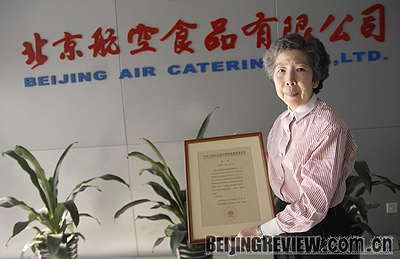|
|

PEOPLE FIRST: Annie Wu, the first Hong Kong investor on the Chinese mainland, says social welfare programs are an important part of her business (By WEI YAO) |
China has been the biggest recipient of foreign direct investment (FDI) among developing nations for 16 consecutive years. While thousands of foreign-funded enterprises continue to sprout up and score successes on the mainland every year, few of them have any idea who laid the path for the country's FDI inflows.
Annie Wu, whose father was the founder of the Hong Kong-based catering giant Maxim's Group, was the very first overseas entrepreneur who opened the door for foreign investment on the sprawling Chinese mainland.
Meeting Wu is truly a whirlwind experience. Always running on a tight schedule, the 60 year old races against time, hurrying from one place to another, as if her life was a movie stuck in fast-forward. Nevertheless, she remains in high spirits when at work and says she's still far away from retiring.
"I would wish there were two more hours each day so that I could work even longer," she said.
Despite having made her fortune decades ago, Wu has defied the established image of a wealthy, bejeweled Hong Kong woman. She dresses simply and plainly and is quick to respond to questions. Her eyes sparkle when she recalls the early memories of her adventures on the mainland.
One day in 1978, Wu was on a train from Wuhan to Guangzhou during her first trip to the mainland when the railway radio started to broadcast an address by Deng Xiaoping, the chief architect of China's reform and opening-up drive.
"I heard Deng saying in a clear and determined voice that the country would in the future focus on economic development and welcome overseas investment," Wu said. "I just felt that some big opportunities on the mainland would come soon."
Wu's hunch came true in 1980 when China and the United States decided to launch direct flights between the two countries.
"This meant that the mainland would need an experienced air caterer like my father's Maxim's to service the planes flying out of Beijing," she said.
As a result, Wu swiftly approached mainland aviation authorities in an attempt to set up a joint venture while most other investors maintained a wait-and-see attitude.
Their talks proceeded slowly at first. "The mainland authorities just had no experience in bringing in foreign investments," Wu said. "And some other barriers such as language differences and cultural clashes also added difficulties to the talks. But we firmly believed that a partnership based on mutual trust and understanding was destined to score success."
After receiving official approval, the joint venture-Beijing Air Catering Co. Ltd.-finally opened in May 1980, making Wu the "proud" owner of the mainland's joint venture No. 001, jointly run by Air China Ltd. and Maxim's. Air China holds a majority 60-percent stake in the company and is, till now, also its largest customer.
During the past 28 years, the company has witnessed the earth-shattering economic changes that have taken place on the mainland and has enjoyed spectacular growth itself.
In the early years, the company could only produce 100-200 meals a day. Today it makes about 70,000 meals per day, taking up the lion's share of the air catering market in Beijing. The company also has provided catering services for the Beijing Olympic Games and the Qinghai-Tibet Railway, the world highest and longest plateau railroad.
"What we brought in was not only capital, but also advanced technologies, modern managerial expertise and international standards for food safety, which are what the mainland mostly needed," Wu said.
| 